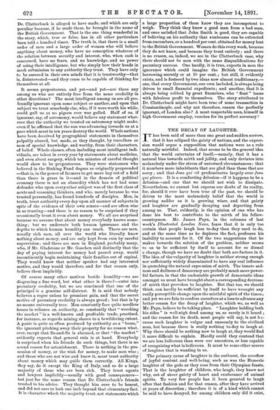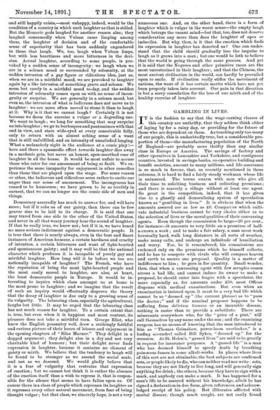THE DECAY OF LAUGHTER.
IT has been said of more than one great and sudden sorrow, that it has eclipsed the gaiety of nations, and the expres- sion would argue a supposition that nations were as a rule naturally mirthful. Indeed, that seems to be the general idea that the world entertains of itself,—namely, that it has a natural bias towards mirth and jollity, and only deviates into melancholy under the stress of untoward circumstances ; that it numbers more inhabitants that are glad than those that are sorry ; and that Jean qui rit predominates largely over Jean qui pleure. It is a comforting delusion—if it happens to be a delusion—and one that we should not wish to dissipate. Nevertheless, we cannot but express our doubt of its reality, for, should it ever have been true of the past, we should be driven to the most melancholy belief that the world is growing sadder as it is growing wiser, and that gaiety and laughter are gradually decaying and departing from among us. That, evidently, is the opinion of one who has done his best to contribute to the mirth of his fellow- countrymen. Mr. James Payn, in the columns of last week's Illustrated London News, fears that it is only too certain that people laugh less to-day than they used to do, and at the same time as he deplores the fact, professes his inability to account for it. Of the two suggestions that he makes towards the solution of the problem, neither seems to us to be sufficient by itself to account for so dismal a change, though we have no doubt that both are factors in it. The idea of the vulgarity of laughter is neither strong enough nor sufficiently widely disseminated to have any real influence in quenching the natural expression of mirth. The innate sad- ness and dullness of democracy are probably much more power- ful factors, in that the undeniable growth of democratic ideas amongst us must have brought about a corresponding decrease of mirth that provokes to laughter. But that too, we should think, can hardly be sufficient by itself to have wrought any really perceptible change upon the mirthful spirit of the times ; and yet we are fain to confess ourselves at a loss to advance any better reason for the decay of laughter, which we, as well as Mr. Payn, believe to be taking place. " Laughter holding both his sides" is well-nigh dead among us, so rarely is it heard ; and the reason for its death, most people will say, is not b e- cause such laughter is vulgar and unseemly to the civilised man, but because there is really nothing to-day to laugh at. Why there should be nothing now to laugh at, they would find it more difficult to explain. Hardly could they contend that we are less ludicrous than were our ancestors, or less capable of recognising what is ludicrous. It must be some other source of laughter that is wanting in us.
The primary cause of laughter is the outburst, the overflow of joyful content and well-being, such as was the Homeric laughter of the gods as they rose from their Olympian feasts. That is the laughter of children, who laugh, they know not why, out of sheer gaiety of heart and exuberance of animal spirits. To very few people has it been granted to laugh after that fashion and for that reason, after they have arrived I at years of discretion ; therefore it is of a kind which cannot be said to have decayed, for among children only did it exist, and still happily exists, moat unhappy, indeed, would be the condition of a country in which such laughter as that is stilled. But the Homeric gods laughed for another reason also; they laughed consumedly when Vulcan came limping among them, the laughter of derision and of the comfortable sense of superiority that has been suddenly engendered in those that laugh. We, too, laugh when Vulcan limps, but with less heartiness and more bitterness in the deri- sion. Actual laughter, according to some people, is pro- voked by a sudden sense of incongruity : we laugh when we are in a solemn mood or surrounded by solemnity, at the sudden intrusion of a gay figure or ridiculous idea, just as, when we are in a mirthful mood, we are provoked to laughter again by a like intrusion of something grave and solemn. We seem but rarely in a mirthful mood to-day, and the sudden intrusion of solemnity comes upon us with no sense of incon- gruity or surprise. We are generally in a solemn mood, but even so, the intrusion of what is ludicrous does not move us to laughter: we are more often moved to stone it than to laugh at it. Why is it that we cannot laugh P Certainly it is not because we deem the exercise a vulgar or a degrading one. We want to laugh ; we long for something that may surprise us into laughter ; we go to burlesques and pantomimes with that end in view, and stare wide-eyed at every conceivable folly, only to return with an almost aching sense of a want that is still unfulfilled, and an intensity of unsatisfied longing. What a melancholy sight is the audience at a comic play!— here and there a spasmodic effort towards laughter dies away in a sardonic grin, but never an honest, open-mouthed roar of laughter in all the house. It would be most unfair to accuse those who cater for our amusement of being at fault. We ex- perience the same incapacity for enjoyment in other comedies than those that are played upon the stage. For some reason or other, the ludicrous and ridiculous seem rather to excite our anger than our sense of amusement. The incongruous has ceased to be humorous ; we have grown to be so terribly in -earnest, that we can no longer see the comic side of men and things.
Democracy assuredly has mach to answer for, and will have more ; but if it robs us of our gaiety, then there can be few graver sins to be laid to its charge. It is said that one may travel from one side to the other of the United States, and never in all that weary journey hear the sound of laughter. If that be really true, we know not; but if it is, we have heard no more serious indictment against a democratic people. It is true that there is nearly always, even in the best and finest instances of American humour, a certain hardness and cruelty of intention, a certain bitterness and want of light-hearted and spontaneous gaiety ; and it may well be that the national character which produces it is incapable of purely gay and mirthful laughter. How long will it be before we too are nationally incapable of laughter ? The French, who have the reputation of being the most light-hearted people and the most easily moved to laughter, are also, at heart, the least democratic people in Europe. It would be in- teresting to inquire which class amongst us at home is the most prone to laughter ; and we imagine that the result of such an inquiry would effectually disprove the theory that the decay of laughter is due only to a growing sense of its vulgarity. The labouring class, especially the agricultural, laughs but little. It may be urged that the labouring class has not much reason for laughter. To a certain extent that is true, but even when it is happiest and most content, its pleasure does not take a mirthful turn. George Eliot, who knew the English peasantry well, drew a strikingly faithful and carious picture of their hours of leisure and enjoyment in the opening chapters of " Silas Marner." They delight in a clogged argument ; they delight also in a dry and not very charitable kind of humour ; but their delight never finds expression in laughter, because it contains no element of gaiety or mirth. We believe that the tendency to laugh will be found to be stronger as we ascend the social scale, and not as we descend. We would gladly believe that it is a fear of vulgarity that restrains that expression of emotion; but we cannot but think it is rather the absence of, the emotion itself than a wish to repress it, that is respon- sible for the silence that seems to have fallen upon us. Of course there is a class of people which represses its laughter as it represses every other natural movement, from fear of being thought vulgar ; but that class, we sincerely hope, is not a very numerous one. And, on the other hand, there is a form of laughter which is vulgar in the worst sense—the empty laugh which betrays the vacant mind—but that, too, does not deserve consideration any more than does the laughter of apes or imbeciles. But why, then, is it that the emotion which finds its expression in laughter has deserted us P One can under- stand that the child should gradually lose the impulse to laugh as it grows into a man ; but one would be loth to believe that the world is going through the same process. And yet it is said that the Negroes and other primitive races are the most unrestrained in their laughter ; and that the Chinese, the most ancient civilisation in the world, can hardly be prevailed upon to smile. If civilisation really stifles the merriment of nations, the want of it has certain merits which have not yet been properly taken into account. Our gain in that direction is but a sorry consolation for the loss of our mirth and of the healthy exercise of laughter.







































 Previous page
Previous page